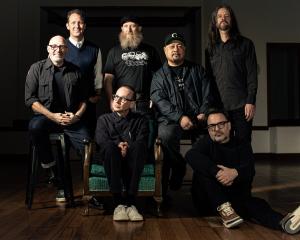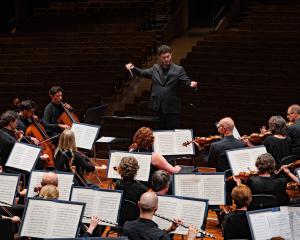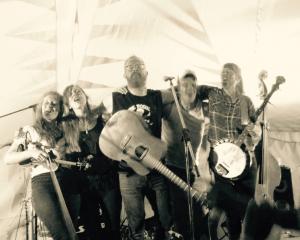
On a recent crisp afternoon, Steve Jones, the guitar architect of London punk in its primacy, zipped down Hollywood Boulevard in his shiny white hybrid Toyota, which is customised with a rooftop image of her majesty Queen Elizabeth, a safety pin jutting from her lip.
And you thought punk rock was dead.
Even with the distraction of nubile young tourists strolling up the Walk of Fame, Jones was in a melancholy mood.
You see, like so many people in America these days, the 53-year-old rock star turned radio DJ is looking for a job. "It's weird not to have somewhere to go," Jones said.
"And wherever I do go next won't be the same, I know that."
Jones joined the ranks of the unemployed in January when Indie 103.1, a scruffy but revered LA rock station, became a victim of a vicious downturn in advertising revenue.
For five years, the Sex Pistol had been the gloriously unpolished voice of "Jonesy's Jukebox", an eccentric and unpredictable two-hour lunchtime show on which he played any obscure record he wanted, chatted up famous guests or just, well, whistled. The show was rebroadcast in the late afternoon, and its pirate soul became the signature of a station that Rolling Stone, Esquire, Spin and other national magazines celebrated as the best commercial radio outlet in the nation.
"Indie, that was my radio station, so to speak," Jones said.
"I think people are starting to really miss it and realise how special it was.
"And for me, taking the job, it got me out of a rut that I was always in.
"I'm pretty much an isolated person. I'd rather stay home and play video games.
"For me to go somewhere every day, it was the best thing for me as a human.
"It got me away from the madness in my head."
Many people miss Indie, which was eulogised far beyond the reach of its famously feeble signal.
Bloggers who only had read about the station wrote tributes to it as a vinyl spirit in the Digital Age.
When the station's corporate chiefs at Entravision abruptly switched the call name to El Gato 103 and began pumping regional Mexican music, rock fans of a certain age reacted the same way they did when Tower Records closed or CBGB was shuttered in New York.
"A lot of people were devastated; Indie was a community, and it was chaotic and unpredictable and had all this rare energy," said Mark Sovel, Indie's former music director.
Indie might be in the ground for good, but Jones is likely to land on his feet.
Calls have been coming in from traditional radio stations and satellite radio and internet ventures.
He cancelled a trip to Hawaii last week to handle some new overtures, but he said he was proceeding cautiously.
"Wherever I go, I will still do my show the same; I wouldn't change it.
"I don't think I should, and I hope any of these people that are thinking of hiring me aren't going to try to mould me into something else," Jones said.
"I'd be bored out of me brain. I'd last two weeks if they had me reading some nonsense.
"If you want someone to read a piece of paper, just hire someone else."
Jones is also leery of any post where his listeners couldn't tune in on a transistor radio.
Local radio, like freeway asphalt, links communities in the mad sprawl of Los Angeles.
"The thing I liked about Indie is you could really be in your town," Jones said.
"When you do satellite, you're in space. It could have been recorded a month ago."
"Jonesy's Jukebox", if you never heard it, had some of the pacing of Howard Stern's unhurried ramble but with the bleary voice of a rock survivor who, despite 25 years of sobriety, still sounds hung over.
His guests - among them Paul McCartney, Brian Wilson and Robert Plant - responded to him as a showbiz peer.
Jones also says he doesn't really need to work (there's enough money in the bank after recent Pistols reunion tours), but he also dreads the idea of slipping into a hermit's life.
"I can't get enough of Call of Duty," he said.
"I'm the oldest guy who plays on PlayStation. But 53 is the new 16."
When Jones really was 16, he was a juvenile delinquent of the first order.
He was saved from a life of crime by rock 'n' roll - well, mostly saved.
At one point, he did steal David Bowie's microphone and gear, equipment that went to good use when the Pistols made their searing debut in 1975.
The Pistols released just one album and imploded, but it was enough to eventually land the band in the Rock and Roll Hall of Fame.
Jones moved west in 1982 after a year in New York, during which he sold his passport for dope money.
He was homeless for a while and floating in a heroin haze.
He cleaned up, looked around and realised he loved Southern California. "I've lived here now longer than I lived in London," he said.
"I really appreciate the place now.
"People would recognise my voice too.
"They would say, `You're that guy on the radio.' I miss that."












